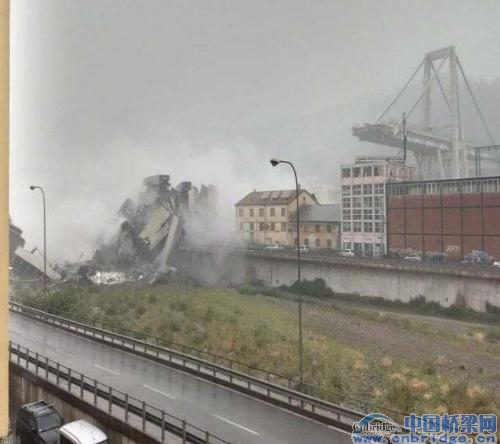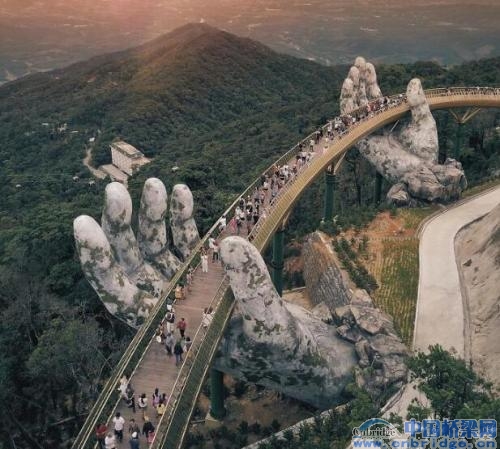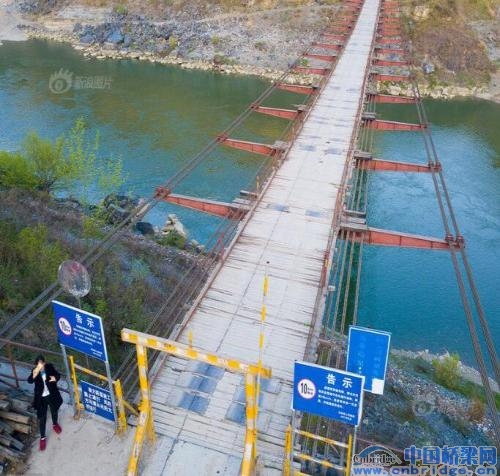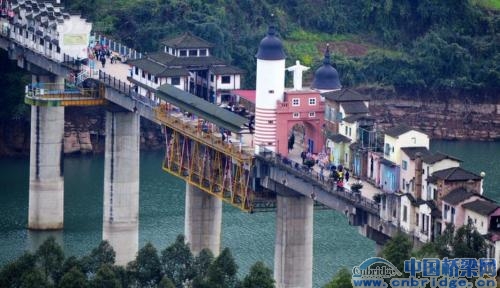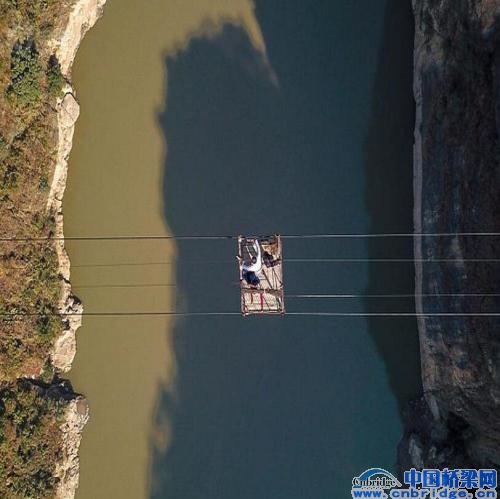桥梁建设直接反映国家实力和科技水平,各个时期、各个国家概莫能外。过去40年韩国桥梁发展迅速,其数量从1970年的9322座增至2007年的22937座、长度从268km增至1987km。桥长增加五倍而座数仅增加一倍,意味着韩国在大跨径桥梁领域取得了惊人进步,代表作有永宗大桥(自锚式悬索桥、主跨300m双层公铁两用)、仁川大桥(跨径80+260+800+260+80m,居世界斜拉桥第6位)、光阳悬索桥(主跨1545米,居世界第4位)、积金大桥(主跨850m)、木浦大桥(主跨840m)及建设中的蔚山大桥(主跨1150m)、新世纪大桥(两个主跨650m)等。
韩国邮政自2004年9月发行《韩国的桥》系列邮票,共发行四组:第一组为2004年发行的古代桥梁,包括镇川笼桥Jincheon Nongdari Bridge、传串桥Jeongotgyo Bridge、锦川桥Geumcheongyo Bridge和升仙桥Seungseongyo Bridge;第二组为2005年发行的拱桥,包括傍花大桥Banghwa Bridge、统营大桥Tongyeong Bridge、汉江大桥Hangang Bridge和EXPO大桥Expogyo (Bridge);第三组为2006年发行的斜拉桥,包括奥林匹克大桥the Olympic Bridge、西海大桥Seohae Bridge、昌三大桥Changseon-Samcheonpo Bridge和珍岛大桥Jindo Bridge;第四组为2007年发行的悬索桥和桁架桥,包括广安大桥Gwangan Bridge、圣水大桥Seongsu Bridge、城山大桥Seongsan Bridge和永宗大桥Yeongjong Bridge(以上详见《[集邮] 透过韩国邮票 体味韩国桥梁魅力(上)》)。
除此以外,韩国其他邮票上也多次出现了桥梁题材,比较典型的有1962年发行的《5月16日革命一周年》可见首尔汉江桥、2001年发行的《千禧系列(第11组)》邮票有首尔至釜山高速公路三层互通式立交桥、2005年发行的《2005 APEC Economic Leaders’ Meeting》可见釜山广安大桥、2009年发行的《韩国 -巴西建交50周年》有韩国仁川大桥和巴西奥利韦拉大桥、2012年发行的《迷人的旅游目的地》可见宫南池木梁桥、2013年发行的《韩国与德国建交130周年》可见首尔景福宫醉香桥等(以上详见《[集邮] 透过韩国邮票 体味韩国桥梁魅力(下)》)。
01、韩国的桥系列(第一组):古代桥梁Korean Bridge Series (1st):old bridges
01-1。镇川笼桥Jincheon Nongdari Bridge:位于忠清北道镇川世金津,忠清北道有形文化财28号(类似中国的省级文物保护单位),高丽时代后期所建,原长100m,现存93m。Jincheon Nongdari Bridge (Tangible Cultural Asset No. 28 of Chungcheongbuk-do Province) Located at Segeumcheon Stream in Jincheon, Chungcheongbuk-do Province, the bridge is quite unique as it is constructed of small pebbles assembled as if they were the scales of a fish. Presumed to have been built in the late Goryeo Dynasty (918-1392), the original length of the bridge is estimated to have been more than 100 meters. Now, however, the bridge is 93 meters long and only 25 piles among the original 28 remain. With a width of more than 1 meter, the bridge remains intact until this day, having withstood the harsh summer monsoon seasons even though no lime or other adhesive building material was used in construction, indicating how advanced scientific methods of construction were at the time.
01-2。传串桥Jeongotgyo Bridge:位于首尔城东区,为朝鲜时代首都汉阳(即现在的首尔)与东南地区连接的主通道。1920年遭洪水冲垮部分,1970年复建。Jeongotgyo Bridge (Historical Asset No. 160) Located at Seongdong-gu, Seoul is the Jeongotgyo Bridge (also known as the Salgojidari Bridge) which was a major transportation route linking Hanyang (the capital city of the Joseon Dynasty) and the southeastern region. The bridge, the biggest of its kind built during the early Joseon Dynasty, is made of 64 rock pillars. To reduce the resistance of the water, the rock pillars were cut into diamond shapes. Unfortunately, parts of the bridge were damaged due to torrential rains during the 1920s. The bridge was restored in the 1970s however, its appearance does differ from that of the original."
01-3。锦川桥Geumcheongyo Bridge:世界文化遗产--昌德宫内的一座桥,建于朝鲜太宗11年(公元1411年),为首尔现存最早的在石桥。总长12.9m。Geumcheongyo Bridge Located at Changdeokgung Royal Palace, which is registered as UNESCO`s World Cultural Asset, Geumcheongyo Bridge was constructed in 1411 (11th year of King Taejong`s reign during the Joseon Dynasty) and is the oldest stone bridge among those remaining in Seoul. Standing 12.9 meters long and 12.5 meters wide, two arches are built from the foundation rocks in the stream bed. A rock carved in the shape of a mythical unicorn lion is located on the south side of the foundation rock, and that of a turtle is installed on the north side. Behind the carved rocks where the arches meet, is a carving of the face of a ghost, which is meant to chase away demons.
01-4。升仙桥Seungseongyo Bridge:位于全罗南道顺天仙岩寺,花岗岩修建,属于宝物400号。Seungseongyo Bridge (Treasury No. 400) Situated at Seonamsa Buddhist Temple in Suncheon, Jeollanam-do Province, the Seungseongyo Bridge is a granite structure built in the shape of an arch. Constructed during the Joseon Dynasty (1392 - 1910), the foundation of the bridge is made of natural rocks, and the construction is sophisticated enough to withstand powerful floods. When constructing the bridge, long carved rocks were connected with each other to create a rainbow-shape arch, which forms a complete half circle. And at the center of the bridge, a rock is carved in the shape of a dragon`s head that protrudes to the below, creating an ornamental effect and adding beauty to the bridge.
02、韩国的桥系列(第二组):拱桥Korean Bridge Series (2nd):arch bridges
02-1。傍花大桥Banghwa Bridge:是汉江(Han River)上建造的第27座桥,该桥为一座钢结构高速公路拱桥,和谐的拱架象一架飞机在起飞。它全长2559米,主跨为540米,桥面宽31.11米,双向6车道,1995年12月动工,2000年11月11日竣工。参见博文《[收藏] 沟通的工具 凝固的音符__邮票与桥梁》之桥06。Banghwa Bridge, completed in 2000, was designed to be reminiscent of the landing and taking off of planes. This 27th bridge over the Han River links Banghwa-dong in Gangseo-gu, Seoul and Goyang City in Gyeonggi-do. The total length of the bridge is 2,559 meters, which is the longest of the bridges over the Han River. With a width of 31.11m and 6 lanes in both directions, the bridge greatly improves the flow of traffic to and from the airport."
02-2。统营大桥Tongyeong Bridge:1998年通车,149m的拱形空间设制了196个投光灯,夜晚时拱形倒影在水面中成橄榄球形状,总长591m。Tongyeong Bridge, which links Dang-dong Misu-dong over Chungmu canal, was opened to public in 1998. Over the span of its 149-meter long arch, 196 lights were installed, which reflect a rugby ball shape of lights over the canal at night, in a feast of lights along with green lighting. Length: 591m Width:20.7m
02-3。汉江大桥Hangang Bridge:始建于1917年,后因交通量增加于1937再建成拱形,1982依同一形状再建一"双胞胎"桥,总长841m。Hangang Bridge, also known as a ""pedestrian bridge"" as it was mostly used by people and carriages, was built in 1917 as a gateway from the center of Seoul to Noryangjin in the southern part of the city. As traffic increased, the bridge was reconstructed as an arch bridge in 1937. In 1982, an identical bridge was built next to it, constituting twin bridges Length: 841m Width: 20m
02-4。EXPO大桥Expogyo (Bridge):为期盼93大田EXPO举办成功而建,结合阴阳造化之意,太极纹样之象征,桥两侧以红,蓝二色成交叉拱形,同时纪念加入EXPO一百周年,特设计100个铁索,总长330m。Expogyo (Bridge) was built 1993 over Gapcheon stream stretching from Daejeon city center to Yuseong city in time for the successful hosting of the 1993 Daejeon International Expo. A red and a blue arch cross above the bridge, symbolizing the Great Absolute of Yin and Yang. Also, 100 cables were installed in the shape of a folding fan to commemorate the 100th anniversary of Korea`s first participation in an International Exposition. Length: 330m Width: 18m
03、韩国的桥系列(第三组):斜拉桥Korean Bridge Series (3rd):cable-stayed bridges
03-1。奥林匹克大桥the Olympic Bridge:为纪念韩国88奥林匹克而建,1990年完工,连接首尔广津区与松坡区,中间石塔高88m,寓意88汉城奥运会,铁索24个寓意24届奥林匹克运动会,总长1.47Km。Olympic Bridge In commemoration of the 1988 Seoul Olympic Game, the Olympic Bridge was completed in 1990, linking Guui-dong, Gwangjin-gu and Pungnap-dong Songpa-gu. At the center of the Bridge stands its 88m-high main tower that symbolizes the 1988 Seoul Olympic Game. At each side of the main tower are 12 hanging cables, with the number of cables totaling 24, meant to symbolize the 24th Olympic Games held in Seoul. The Bridge is 30m wide and 1.47km long, of which the cable-stayed section of the bridge extends 300m.
03-2。西海大桥Seohae Bridge:位于京畿道平泽市与忠清南道唐津郡,2000开通,主塔高182m,两主塔间隔为470m,可供5万吨船舶往来,总长7.31Km。Seohae Bridge Its supports shaped like “flagpoles,” the Seohae Bridge links Pyeongtaek city, Gyeonggi Province and Dangjin county, South Chungcheong Province. Opened in 2000, this Bridge is emerging as the gateway to the West Sea commerce that will lead the era of Northeast Asian trade. As the largest cable-stayed bridge in Korea, its main towers are 182m high and the distance between each is 470m, allowing a 50,000-ton vessel to pass between them under the Bridge. The Bridge is 31.41m wide and 7.31km long, of which the cable-stayed section of the bridge is 990m.
03-3。昌善-三津浦大桥Changseon-Samcheonpo Bridge:位于庆尚南道南海郡与泗川市之间,2003年开通,总长3.4km。Changseon-Samcheonpo Bridge Opened in 2003, the Changseon-Samcheonpo Bridge links Namhae county and Sacheon city in South Gyeongsang Province. Comprised of four sub-bridges (the Samcheonpo Bridge, Choyang Bridge, Neukdo Bridge and Changseon Bridge) and harmonized with the superb scenic beauty of Hallyeohaesang National Maritime Park, the Bridge presents a magnificent spectacle. Of the four sub-bridges, only the Samcheonpo Bridge is a cable-stayed bridge. Changseon-Samcheonpo Bridge is 3.4km long (Samcheonpo Bridge section being 436m) and 14.5m wide.
03-4。珍岛大桥Jindo Bridge:以李舜臣将军的明梁大捷而闻名的蔚乭目海峡间的大桥,位于全罗南道珍岛郡与海南郡间,1984开通,2005年另建双胞胎--珍岛第二大桥,总长484m。Jindo Bridge Laid across the Wooldolmok Straits (also called Myeongryang Straits), which is famous for Admiral Yi Sunshin’s sweeping victory over the Japanese forces, the Jindo Bridge links Jindo county and Haenam county in South Jeolla Province. This Bridge was constructed using as its inspiration the Joseon naval forces and the womenfolks performing “Ganggangsulle” during the Japanese invasion of Korea. Opened in 1984 as the nation’s first cable-stayed bridge, this Bridge has now become a twin bridge, as the second Jindo Bridge was added in 2005. The two Jindo Bridges are both 484m long, with their width being 11.7m and 12.5m, respectively.
[集邮] 透过韩国邮票 体味韩国桥梁魅力(上38P) - 路人@行者 - 路人@行者
04、韩国的桥系列(第四组):悬索桥和桁架桥Korean Bridge Series (4th):suspension and truss bridges
04-1。广安大桥Gwangan Bridge:釜山水泳区南溪洞(音译)和海云台区右洞(音译)间的海边大桥,2002年修建的悬索与斜拉结合的复式桥梁,总长7420m。Gwangan Bridge lies across the sea between Namcheon-dong, Suyeong-gu and U-dong, Haewundae-gu of Busan city. It was completed in 2002 as a double-deck bridge combining the features of a suspension bridge as well as a truss bridge. Of its total length of 7,420m, the suspension-bridge section extends 900m. This is the longest among all suspension bridges in Korea, thus launching a new era in Korea’s bridge construction methods. Boasting beautiful illumination comprising about 100,000 different colors, the Bridge provides a splendid sight. The bridge is 18~25m wide.
04-2。圣水大桥Seongsu Bridge:圣水大桥是首尔横跨汉江的一座桥梁,全长1160米。1977年开工建造并于两年后落成,是韩国第一代跨海大桥,也是汉江上的第十一座大桥。在开通15年后于1994年坍塌,圣水大桥坍塌事件深深触动了韩国民众,也使韩国桥梁建设者认识到了桥梁养护系统的必需性和重要性。在事件发生的第二年,韩国政府对桥梁管理和操作计划提出了一系列更严密的要求。圣水大桥修复后于1997年8月15日重新开放。Seongsu Bridge Linking Seongsu-dong and Apgujeong-dong of Seoul, Seongsu Bridge is 1,160m long. To relieve the traffic congestion of Seoul, the Bridge was completed in 1979 as a truss-bridge, becoming the 11th bridge built over Han River. Since its disastrous collapse in 1994, two rounds of restoration work were conducted. In 1997, the Bridge was reopened with 4 lanes that only directly linked North to South, with no ramps to enter from adjoining roads. In 2004, the Bridge width was expanded from 19.4m to 35m, becoming an 8-lane bridge.
1994年10月21日,韩国首尔圣水大桥一块长达48米的桥板从大桥中段落入江中,6辆汽车包括1辆载满学生及上班族的巴士和1辆载满警员前往庆祝会场地的客货车跌进汉江,导致 32人死亡,17人受重伤。圣水大桥坍塌事件震动了韩国,韩国总统金泳三解除了当时汉城市市长李元钟职务,随后公开向全国人民道歉。韩国国会因此召开紧急会议,强烈谴责这一劣质工程的承建者、建筑行业的腐败行为及政府对国家投资工程缺乏有效的监督和检查。韩国总理李荣德召集内阁紧急会议后,向金泳三总统递交了辞呈,以示承担圣水大桥坍塌事件的责任。韩国执法机关逮捕了7名汉城的建筑官员,检察官指控他们犯有玩忽职守、过失杀人罪。大桥坍塌事故原因调查团经过5个多月的各种试验和研究,于次年4月2日提交了事故报告。事故原因主要有以下两方面:第一,东亚建筑公司没有按图纸施工,在施工中偷工减料,利用疲劳性能很差的劣质钢材,这是事故的直接原因。第二,当时韩国缩短工期及汉城市政当局在交通管理上疏漏也是大桥倒塌的主要原因,大桥设计荷载32吨,建成后交通流量逐年增加,超常负荷,倒塌时负载为43.2吨,超过设计荷载的30%。
04-3。城山大桥Seongsan Bridge:半月型的东亚曲线美和直线美相结合,总长1415m,连接京仁高速,1980年修建的汉江上的第十二座大桥。Seongsan Bridge Boasting excellent representative beauty through the representation of harmony between half-moon-shaped Oriental curvature and lineal beauty, Seongsan Bridge was completed in 1980 as the 12th bridge over Han River. Linking Mangwon-dong and Yanghwa-dong of Seoul, the Bridge connects to Seobu Trunk Road and Gyeongin Highway. As a result, much traffic crosses over the Bridge. As a truss bridge, the Bridge is 1,415m long and 27m wide and has 6 lanes.
04-4。永宗大桥Yeongjong Bridge:始建于95年,为期60个月到2000年完工,是连接首尔市区与仁川国际机场专用高速公路的公路铁路双层大桥,总长4420m。Yeongjong Bridge Shaped after traditional eaves of time-honored Korean houses, Yeongjong Bridge links Gyeongseo-dong (Jang Island) and Unbuk-dong (Yeongjong Island) of Incheon City. The Bridge was completed in 2000 after 60 months of construction that started in 1995. As the exclusive link to Incheon International Airport, the Bridge has two decks which are used for both general traffic and railroad conveyance. The Bridge is 36.1m wide and 4,420m long, 550m of which comprise the suspension bridge section and 2,250m for the truss bridge section.

































